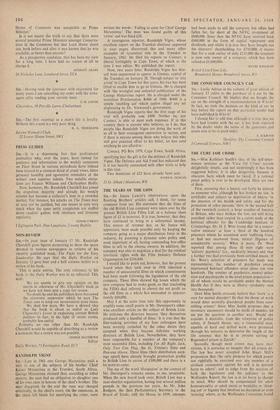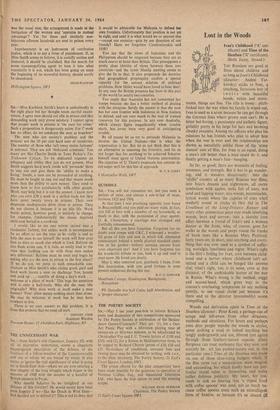THE CURE FOR CRIME Stx,—Miss Kathleen Smith's idea of the
self-deter- minate sentence as the 'Cure for Crime' sounds delightfully simple, and not surprisingly it has been suggested before. It is also dangerous, because it obscures facts which must be faced, if a rational penal policy is ever to be developed. Here are two of them.
First, assuming that a lunatic can fairly be defined as someone who, although he has broken no law, is certifiable and subject to deprivation of liberty 'in the interests of his health and safety and for the protection of other persons,' then, in the second half of the twentieth century, a large number of lunatics in Britain, who have broken the law, are still being punished rather than treated. In a recent study of the habitual offender for the Cambridge Institute of Criminology, Dr. D. J. West found that 'at a conser- vative estimate' at least a third of the hundred • prisoners whom he examined were 'suffering from, or had not recovered from, mental illqesses of considerable severity.' What is more, Dr. West reported that among these ill men eight were 'actively psychotic' (i.e., medically insane) and that a further two had previously been certified insane. If Dr. West's selection of prisoners for study was representative, the number of psychotics among imprisoned habitual offenders must alone run into hundieds. The number of psychotics, mental defec- tives and psychopaths in the total prison population— all of whom would be certifiable under the Mental Health Act if they were at liberty—probably runs into thousands.
Does Miss Smith seriously believe that 'work' is a cure for mental disorder? Or that the threat of work would deter mentally disordered people from com- mitting crimes? Since Miss Smith proposes that a monetary assessment should be made of murder, let me put the question in another way. Would she consider it desirable, from the viewpoint of public safety, if Donald Hume, say, a resourceful man, capable of hard and skilled work, were permitted through his industry to determine the length of the life sentence that he is at present serving at Regensdorf prison in Zurich?
Secondly, though most crimes may have their victims, it is nonsense to imagine that all crimes do. The law has never accepted John Stuart Mill's proposition that 'the only purpose for which power can rightfully be exercised over any member of a civilised community against his will is to prevent harm to others': and to judge from the reaction of both the legislature and the judiciary to the Wolfenden Report, the law is in no hurry to change its mind. Who should be compensated for adult homosexuality or adult incest or bestiality or 'sleep- ing out' or bigamy that involves no deception or even 'poncing' where, as the Wolfenden Committee found
was the usual case, the arrangement is made at the instigation of the woman and 'operates to mutual advantage'? Yet for these and similarly non- injurious offences hundreds are sent to prison every year.
Imprisonment is an instrument of retributive justice, which is to say a form of punishment. If, as Miss Smith seems to believe, it is socially useless and immoral, it should be abolished. But the search for some transmogrifying agent to turn it into what essentially it is not, which has been going on since the beginning of its mournful history, should surely be abandoned.
10 Ovington Square. SW3
GILES PLAYFAIR



































 Previous page
Previous page